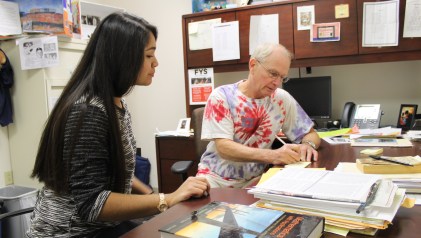TYLER SPRINGER | STAFF REPORTER
The race to get a spot in spring semester classes has begun. Now through early November, students are meeting with their academic advisors to plan out their courses and schedules for the upcoming semester.
Before students go to their advisor, they should create an ideal schedule using the academic requirement report on their my.butler account, associate registrar Josh Hayes said. By doing this, the student will have a starting point for consultation with their advisor.
When the student has planned out a couple of different schedule options, Hayes then recommends scheduling an appointment with an advisor as soon as possible.
“The most important thing, especially for a first year student, is going to your advisor,” Hayes said.
Until the student meets with their advisor, they are unable to register due to Butler’s mandatory advising system. This system places a hold in the student’s my.butler account, which prevents them from enrolling in classes until the advising appointment occurs.
“We want to make sure that students are making adequate degree progress,” Hayes said. “The best way to do that is to be in consultation with their advisor.”
Following their advising appointment, students wait to register until their enrollment appointment. The order of the appointments is determined by the student’s completed credit hours, which means that mostly seniors and students graduating in May will get the first choice at classes.
Kate Morris, provost and vice president for academic affairs, said this system makes it easier for the students who will be graduating soon to take their required courses.
“The closer you are to the end, the more we need to make sure that you get what you need in order to graduate,” Morris said.
Some students get to register earlier than the rest of their class for reasons not based on credit hours. These students have priority registration. Students who are athletes during that semester, in the honors program or have disabilities receive this privilege.
“By having these particular people who are in priority registration categories, we are doing the best that we can to address the issues that are most likely to occur,” Morris said.
Hayes said these issues can include athletic event conflicts, as well as disability restrictions regarding the student’s schedule.
Still, Jeff Weber, a freshmen who is not given priority registration, is nervous he will not receive his ideal schedule, considering most freshmen receive the last enrollment appointment times.
“If the classes you want to take get filled up by other people, then you’re screwed, and have to take classes that you didn’t plan on taking,” Weber said.
Freshmen register in a different order for their spring semester than they do for their fall semester. When freshmen are registering for their fall semester during their new student registration weekend, a moratorium is put in place so that returning students cannot register for core classes until the freshmen have, unless they register early.
“We need to make sure that our first year students have access to the core classes because for many majors, the bulk of the core is completed in the first year,” Hayes said. “The goal is not to inconvenience a big group of students. Just only when we really need to.”
Hayes said this moratorium does not exist for spring registration because there is not usually a large group of incoming freshmen in the spring.
However, freshman are not the only ones who can feel stressed about getting into their desired courses.
Although upperclassmen register fairly early in the process, junior Samantha Jancin still encounters issues when enrolling.
“It’s always been a problem,” Jancin said. “There will be times where I’m literally right on time, and click on the class, and it’s already full.”
In order to prevent problems like Jancin’s, Morris said she recommends keeping an open mind and creating plenty of different schedule scenarios.
“We all go into this thinking ‘here is my ideal world,’” Morris said. “This specific course at this specific time with this specific professor. It almost never works out that way. Be prepared to be flexible.”
Hayes said students should not panic if they do not immediately get into the courses they wanted.
“Advisors are sort of like students’ academic guardian angel,” Hayes said. “They can make a lot of perceived emergencies go away. Keep calm, your advisor is there to help.”
